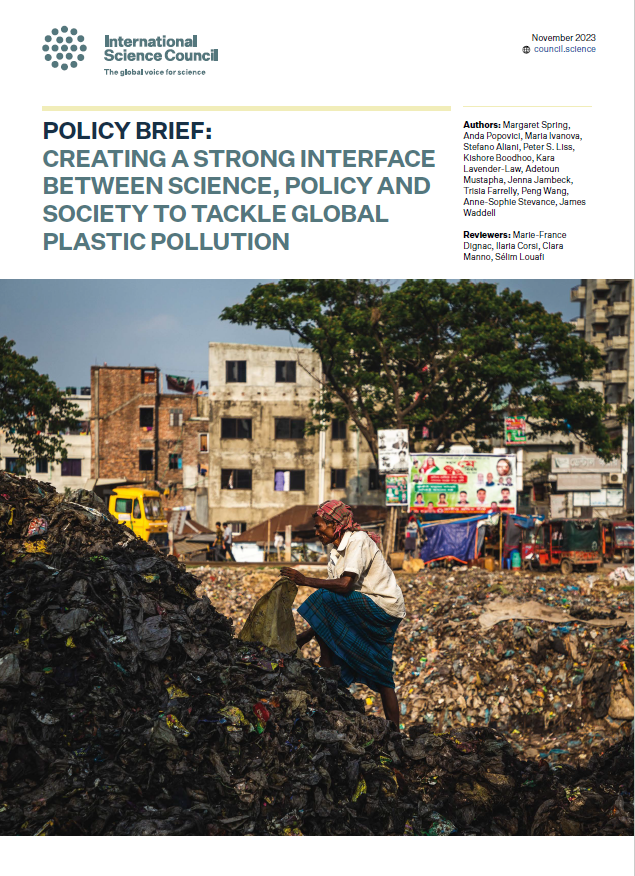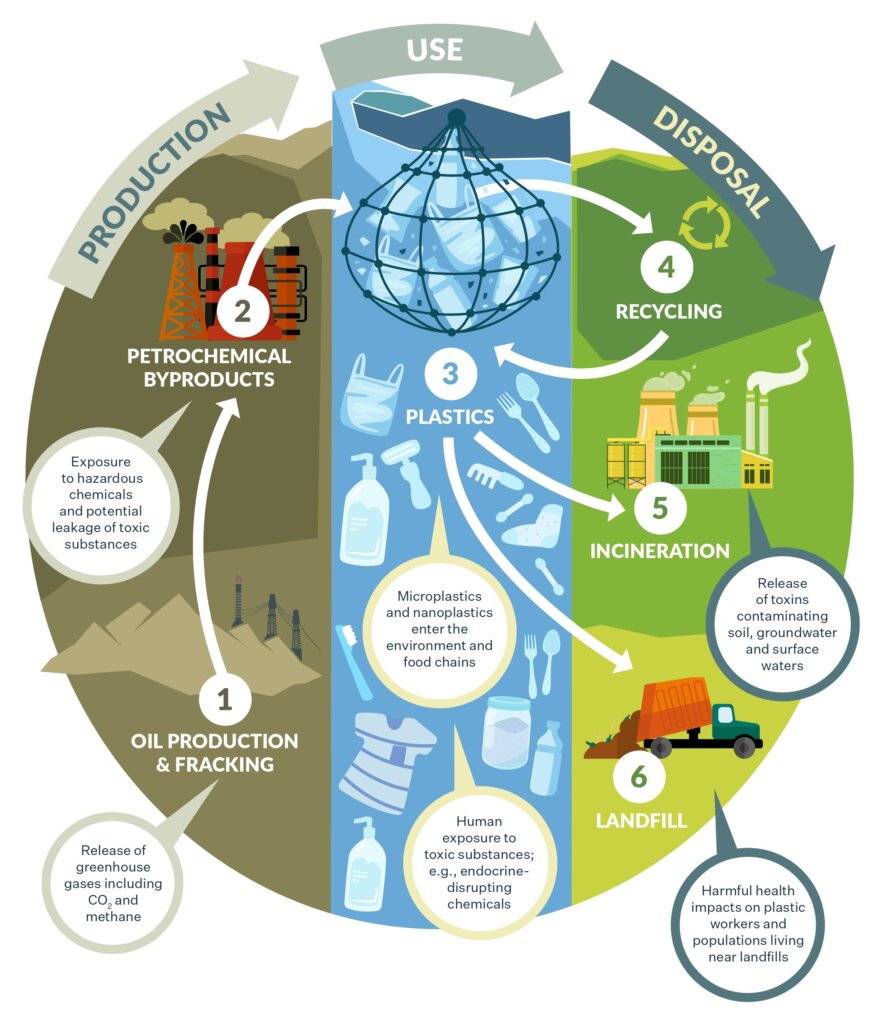
In the face of the all-encompassing spread of plastic pollution to far-flung places on Earth, it has become obvious that immediate and collective international efforts are necessary. In this context, the ISC’s latest policy brief aims to inform the ongoing third session of the Intergovernmental Negotiating Committee (INC-3) held at the UN Environment Programme (UNEP) Headquarters in Nairobi, Kenya, which is developing an international legally binding instrument on plastic pollution.

Policy Brief: Creating a Strong Interface between Science, Policy and Society to Tackle Global Plastic Pollution
International Science Council, 2023. ISC Policy Brief: Creating a strong interface between science, policy and society to tackle global plastic pollution. Paris, International Science Council. https://council.science/publications/plastic-pollution-policy-brief/
The ISC policy brief underscores the necessity of a systems approach to guide policy action throughout the entire life cycle and political of economy of plastics to reduce and ultimately eliminate plastic pollution. The precautionary principle – a commitment that, in the absence of complete scientific certainty, effective measures should not be delayed to prevent potential harm to the environment and human health – should form the basis of our global efforts.
To achieve this goal, the brief calls for the creation of a robust science-policy-society interface mechanism and the establishment of a formalized scientific platform under the INC Secretariat to foster an informed and inclusive approach to the many facets of plastic pollution across the globe.
Modern life is full of plastics, and they have reached every corner of the world and our bodies. With an estimated 6,300 million metric tons of plastic waste generated by 2015, a number projected to nearly double by 2050, the environmental, public health, wellbeing, and global consequences of plastic pollution are profound.
Indeed, microplastics and nanoplastics, released into the environment, can affect organisms at the base of the food web and accumulate in organs, potentially harming human health. Plastic pollution also contributes to climate change, impacts biodiversity and ecosystem resilience, disrupts carbon cycling in the oceans, and has socio-economic costs that disproportionately impact marginalized groups and vulnerable geographies.
Addressing plastic pollution requires a systems approach that considers the entire lifecycle of plastics and the interconnectedness of social, environmental, and economic impacts. Holistic solutions should minimize the production of virgin plastic – plastic produced using natural gas or crude oil and that does not contain any recycled materials –, eliminate harmful additives and unnecessary disposable items, and prioritize research and development of safe and sustainable alternatives.

In a statement to the International Negotiating Committee (INC) Secretariat this week, independent scientists, representing leading organizations like the ISC and the Scientists’ Coalition for an Effective Plastics Treaty, among others, have further underlined the need for a more robust platform for scientific input.
Emphasizing the crucial need for the INC to utilize the best scientific evidence in establishing an effective plastic pollution instrument, the scientists highlighted the absence of a formal platform hindering meaningful engagement. They stressed the urgency of clear modalities for work between INC sessions, proposing the creation of diverse technical groups.
Margaret Spring, one of the key authors of the ISC Policy Brief and Chief Conservation and Science Officer at the Monterey Bay Aquarium, emphasized, ‘There is no formal platform for Member States to engage with scientific expertise at the negotiations for the Global Plastic Treaty. The scientific community is calling for clear access and meaningful participation in the INC process as technical experts’.
The statement urges the INC Bureau and Secretariat to establish such formal guidelines, encourages Member States to mandate a formal platform, and emphasizes the necessity of intersessional technical work, presenting a compelling call for a transparent, inclusive, and science-driven approach to combat global plastic pollution.
✉️ Read the letter.
The ISC proposes a two-phase approach to engage science, policy, and society in combating plastic pollution. In the short term, a platform would be established under the INC Secretariat to enable dialogue, assess solutions, and provide prompt scientific knowledge to enhance negotiations. In the medium to long term, an ongoing science-policy-society mechanism would be put in place to support the implementation of global commitments by synthesizing scientific information, facilitating knowledge generation, offering policy advice, and promoting communication and outreach.
The effectiveness of the proposed mechanism is of utmost concern for the ISC, and achieving this is dependent on key principles. These include independence, an outcome-focused and demand-driven approach, a diversity of scientific disciplines, inclusion of all stakeholders, the utilization of existing initiatives, and a willingness to learn and reflect.
As negotiations at INC-3 unfold, the scientific community, policy-makers, and society must collaborate to implement a robust and science-based international instrument. The proposed science-policy-society mechanism provides a blueprint for informed decision-making, sustainable solutions, and a collective commitment to addressing one of the most pressing challenges of our time.
Uniquely placed to apply its extensive knowledge and expertise to the development of an effective mechanism to support global efforts on combating plastic pollution, the ISC stands ready to work with all parties.
Picture by Shardar Tarikul Islam on Pexels.